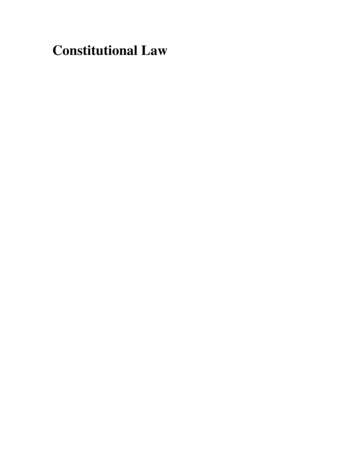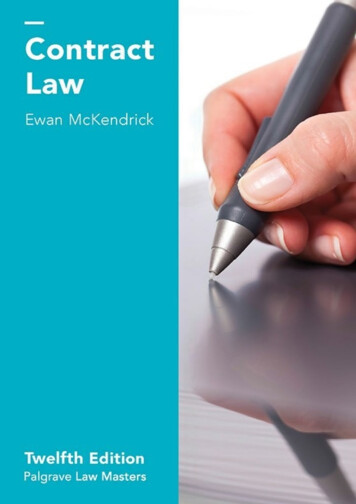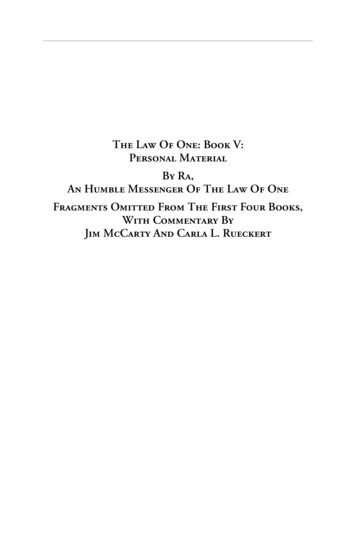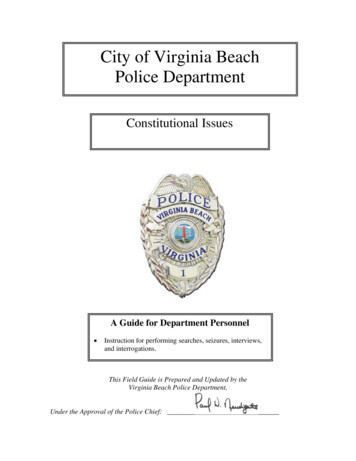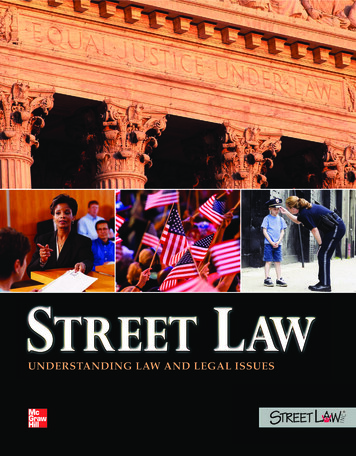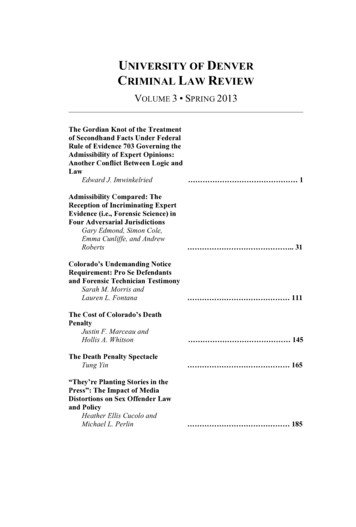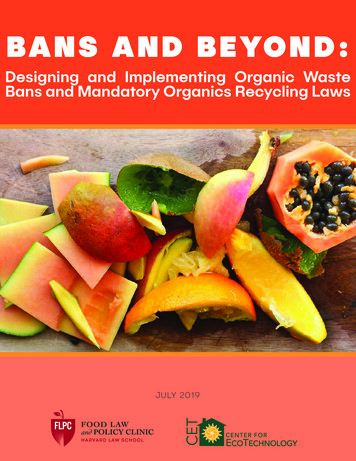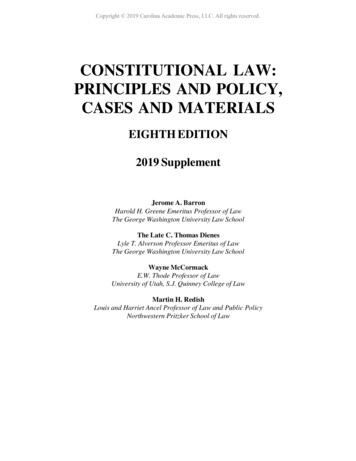
Transcription
Copyright 2019 Carolina Academic Press, LLC. All rights reserved.CONSTITUTIONAL LAW:PRINCIPLES AND POLICY,CASES AND MATERIALSEIGHTH EDITION2019 SupplementJerome A. BarronHarold H. Greene Emeritus Professor of LawThe George Washington University Law SchoolThe Late C. Thomas DienesLyle T. Alverson Professor Emeritus of LawThe George Washington University Law SchoolWayne McCormackE.W. Thode Professor of LawUniversity of Utah, S.J. Quinney College of LawMartin H. RedishLouis and Harriet Ancel Professor of Law and Public PolicyNorthwestern Pritzker School of Law
Copyright 2019 Carolina Academic Press, LLC. All rights reserved.Copyright 2019Carolina Academic Press, LLCAll Rights ReservedCarolina Academic Press700 Kent StreetDurham, North Carolina 27701Telephone (919) 489-7486Fax (919) 493-5668E-mail: cap@cap-press.comwww.cap-press.com
Copyright 2019 Carolina Academic Press, LLC. All rights reserved.TABLE OF CONTENTSChapter 1JUDICIAL REVIEW: INSTRUMENT OF AMERICANCONSTITUTIONALISM .7Ruchon v. Common Cause 7Zivotofsky v. Kerry . .8Chapter 2NATIONAL POWERS & FEDERALISM . .9Arizona State Legislature v. Arizona Independent Redistricting Commission . .9Murphy v. National Collegiate Athletic Association .10National Federation of Independent Business v. Sebelius [Health Care Cases] . 12Shelby County v. Holder. 33Coleman v. Court of Appeals of Maryland . 34Chapter 3STATE POWER IN AMERICAN FEDERALISM. . 35McBurney v. Young . .35Arizona v. United States . .36Chapter 4EXECUTIVE AND CONGRESSIONAL RELATIONS:SEPARATION OF POWERS . .38Gundy v. United States 38NLRB v. Canning .38Lucia v. Securities and Exchange Commission . .43Zivotofsky v. Kerry . . 45Trump v. Hawaii . 46Bond v United States . . 49
Copyright 2019 Carolina Academic Press, LLC. All rights reserved.Wood v. Moss . .52Chapter 5LIMITATIONS ON GOVERNMENTAL POWER . . 55Sessions v. Dimaya .55Caetano v. Massachusetts . . 56Chapter 6FORMS OF SUBSTANTIVE DUE PROCESS . . 58Arkansas Game and Fish Commission v. United States. . . . . . . . . . . . . . . . . . . . . . . . . . . . . . . . . . . . . . . . . . . 58Horne v. Department of Agriculture . 58Murr v. Wisconsin . 59Sveen v. Melin . 59Whole Woman’s Health v. Hellerstedt . . 61Obergefell v. Hodges . . 70Pavan v. Smith . 88Chapter 7THE MEANING OF EQUAL PROTECTION . . 91Armour v. City of Indianapolis . . 91Schuette v. BAMN . . 91Fisher v. University of Texas at Austin. . 94Ala. Legis. Black Caucus v. Alabama. . 105Bethune-Hill v. Virginia State Board of Elections. 106Cooper v. Harris . 107North Carolina v. Covington . . 108United States v. Windsor . . 110Sessions v. Morales – Santana . 123
Copyright 2019 Carolina Academic Press, LLC. All rights reserved.Evenwell v. Abbott . . 126Harris v. Arizona Independent Redistricting Commission . 127Chapter 8FREEDOM OF EXPRESSION. . 128Reed v. Town of Gilbert . 128National Institute of Family and Life Advocates v. Becerra . 128United States v. Alvarez . 131Elonis v. United States. 142Minnesota Voters Alliance v. Mansky 142McCullen v. Coakley . . . 148Lane v. Franks. . 153Williams-Yulee v. Florida Bar . 154Agency for International Development v. Alliance for Open SocietyInternational, Inc. . . 155Walker v. Tex. Div., Sons of Confederate Veterans . .156Matal v. Tam . 163Iancu v. Brunetti .170FCC v. Fox TV Stations, Inc. .170American Tradition Partnership v. Bullock . . 170McCutcheon v. Federal Election Commission . . 171Knox v. Service Employees International Union . 177Janus v. American Federation of State, County and Municipal Employees . 178Packingham v. North Carolina . 179Chapter 9FREEDOM OF RELIGION: ESTABLISHMENT AND
Copyright 2019 Carolina Academic Press, LLC. All rights reserved.FREE EXERCISE. . 181Town of Greece, New York v. Galloway . . 181Hosanna-Tabor Evangelical Lutheran Church v. EEOC . . 183Trinity Lutheran Church v. Comer . 191Masterpiece Cakeshop, Ltd. v. Colorado Civil Rights Commission . 196Burwell v. Hobby Lobby Stores . . 204Holt v. Hobbs . 213American Legion v. American Humanist Assn . .213Chapter 11LIMITATIONS ON JUDICIAL REVIEW . . 215Bank Markazi v. Peterson . . 215United States v. Windsor . . 215Hollingsworth v. Perry . . 216Clapper v. Amnesty International. . 217Susan B. Anthony List v. Driehaus . .218Spokeo, Inc. v. Robins . . 219Wittman v. Personhuballah . 220Bank of America v. City of Miami . 220Gill v. Whitford . 222Benisek v. Lamone . 225
Copyright 2019 Carolina Academic Press, LLC. All rights reserved.Chapter 1JUDICIAL REVIEW: INSTRUMENT OF AMERICANCONSTITUTIONALISM§ 1.03JUDICIALLY IMPOSED LIMITS ON THE EXERCISE OF THE JUDICIALREVIEW POWER: THE “POLITICAL QUESTION” DOCTRINEInsert in p. 46:7. Rucho v. Common Cause, 588 U.S. (2019): In a 5-4 decision, the Supreme Court heldthat the political question doctrine precludes the judiciary from ruling on the constitutionality ofallegedly partisan gerrymandered congressional districting. The majority found that nojudicially manageable standard exists by which to assess such claims. It distinguished its holdingfrom Baker v. Carr by stressing that while the claim of population inequality among districtscan be resolved by employing basic equal protection principles, no comparable standard existsin the partisan gerrymandering context. It further found that partisan gerrymandering claimsdiffer from one-person, one-vote claims because the requirement that “each representative mustbe accountable to (approximately) the same number of constituents does not extend to politicalparties.” Group representation, the majority reasoned, differs significantly from the form ofrepresentation protected by the one-person, one-vote principle.Speaking for four justices in dissent, Justice Kagan criticized the majority for“promot[ing] partisanship above respect for poular will.” She expressed the view that there existclear and manageable standards for courts to apply to adjudicate partisan gerrymanderingclaims. She rejected the majority’s reliance on historical practice, noting that racialgerrymandering and vote dilution, which are now held to be unconstitutional, also had wellestablished historical pedigrees.[B] Foreign Affairs and Political Questions Add before§ 1.03[C]:4. Recognition of foreign states. As Goldwater implies, by tradition one of the most inviolateof Presidential powers is the recognition of foreign governments. The power flows from theexplicit grant of power to “receive Ambassadors,” an act that allows the President to pick whichof competing claimants is the legitimate government of another nation. In Zivotofsky v. Clinton,132 S. Ct. 1421 (2012), the Court confronted this in the unusual situation of the status of the city ofJerusalem.In 2002, Congress adopted legislation dealing with placement of the U.S. Embassy in Jerusalemand providing that “[f]or purposes of the registration of birth, certification of nationality, orissuance of a passport of a United States citizen born in the city of Jerusalem, the Secretary shallupon the request of the citizen or the citizen’s legal guardian, record the place of birth as Israel.”The U.S. parents of a child born in Jerusalem requested that the child’s birth certificate andpassport list Israel as the child’s place of birth. The Secretary instead listed Jerusalem as the placeof birth and argued that the political question doctrine precluded judicial review since resolving7
Copyright 2019 Carolina Academic Press, LLC. All rights reserved.the claim on the merits would necessarily require a court to decide the political status of Jerusalem.The Court disagreed on the ground that it was up to the courts to determine whether thestatute was constitutional. The Court remanded for the lower courts to make an initial assessmentof whether the statute impermissibly interfered with the Executive power to recognizegovernments.[B]ecause the parties do not dispute the interpretation of § 214(d), the only realquestion for the courts is whether the statute is constitutional. At least sinceMarbury v. Madison, we have recognized that when an Act of Congress is allegedto conflict with the Consititution, “[i]t is emphatically the province and duty ofthe judicial department to say what the law is.” . In this case, determining theconstitutionality of § 214(d) involves deciding whether the statute impermissiblyintrudes upon Presidential powers under the Constitution. If so, the law must beinvalidated and Zivotofsky’s case should be dismissed for failure to state a claim.If, on the other hand, the statute does not trench on the President’s powers, thenthe Secretary must be ordered to issue Zivotofsky a passport that complies with §214(d). Either way, the political question doctrine is not implicated. “No policyunderlying the political question doctrine suggests that Congress or the Executive can decide the constitutionality of a statute; that is a decision for the courts.”The Secretary contends that “there is ‘a textually demonstrable constitutionalcommitment’ ” to the President of the sole power to recognize foreign sovereignsand, as a corollary, to determine whether an American born in Jerusalem maychoose to have Israel listed as his place of birth on his passport. Perhaps. But thereis, of course, no exclusive commitment to the Executive of the power to determinethe constitutionality of a statute. The Judicial Branch appropriately exercises thatauthority, including in a case such as this, where the question is whether Congressor the Executive is “aggrandizing its power at the expense of another branch.”Our precedents have also found the political question doctrine implicated whenthere is “ ‘a lack of judicially discoverable and manageable standards forresolving’ ” the question before the court. Framing the issue as the lower courtsdid, in terms of whether the Judiciary may decide the political status of Jerusalem,certainly raises those concerns. They dissipate, however, when the issue isrecognized to be the more focused one of the constitutionality of § 214(d).Recitation of these arguments — which sound in familiar principles ofconstitutional interpretation — is enough to establish that this case does not “turnon standards that defy judicial application.” Resolution of Zivotofksy’s claimdemands careful examination of the textual, structural, and historical evidence putforward by the parties regarding the nature of the statute and of the passport andrecognition powers. This is what courts do. The political question doctrine posesno bar to judicial review of this case.Zivotofsky v. Kerry, 135 S. Ct. 2076 (2015). On remand, the D.C. Circuit held the statuteunconstitutional. The Supreme Court agreed – see § 4.03[1] infra.8
Copyright 2019 Carolina Academic Press, LLC. All rights reserved.Chapter 2§ 2.01NATIONAL POWERS & FEDERALISMTHE NATURE OF FEDERAL POWERPage 78: add before § 2.02:13. Arizona State Legislature v. Arizona Independent Redistricting Commission, 135 S. Ct. 2652(2015). The Supreme Court, 5-4, per Justice Ginsburg, held that the Elections Clause of the U.S.Constitution, Art. I, §3, cl. l, did not prevent Arizona voters from establishing by a ballot initiative,known as Proposition 106, the Arizona Independent Redistricting Commission (AIRC). Thepurpose of establishing the AIRC was to end “ ʻthe practice of gerrymanderingʼ ” as well as toimprove “ ʻvoter and candidate participate in elections.ʼ ” Proposition 6 took away redistrictingauthority from the legislature and gave it to the AIRC. Pursuant to the 2010 Census, the AIRCadopted a redistricting map for both federal and state legislative districts.The Arizona legislature challenged the redistricting map and contended that it violated theElections Clause which states: “The Times, Places and Manner of holding Elections for Senatorsand Representatives shall be prescribed in each State by the Legislature thereof; but the Congressmay at any time by law make or alter such Regulations.” The Arizona legislature brought suitbefore a three judge district court and argued that the reference to the state legislature in theElections Clause precluded creating the AIRC and assigning it the redistricting authority whichhad previously belonged to the legislature. The three judge district court rejected the Arizonalegislature’s Election Clause contentions.The majority of the Supreme Court was no more sympathetic to the Arizona legislature’s readingof the Election Clause than the three judge district court had been. However, first, there was anissue as to whether the Arizona legislature had standing to bring suit. The Supreme Court ruled thatthe legislature had standing. By contending that Proposition 106 stripped it of its allegedconstitutional prerogative to set legislature districts, the legislature had shown a concrete andparticularized injury which was fairly traceable to the conduct complained of and which wouldbe redressed by a favorable ruling. This was because Proposition 106 would completely presentany vote by the legislature now or in a future time from adopting a redistricting plan.On the merits, Justice Ginsburg said that the words “the Legislature” in the Constitution havedifferent meanings depending upon the context in which the words are used. In the context ofregulatory congressional elections, the words “the Legislature” included “the referendum and thegovernor’s veto.” The Court saw “no constitutional barrier” to a State’s “empowering of its people”by use of the referendum and the ballot initiative. The Court declared the dominant purpose ofthe Elections Clause “was to empower Congress to override state election rules, not to restrict theway States enact legislation.” Justice Ginsburg said that Arizona voters used the ballot initiativein order that the “ ʻvoters should choose their representatives, not the other way around.ʼ ” TheSupreme Court upheld the constitutionality of the AIRC and affirmed the judgment of the threejudge district court.Chief Justice Roberts, joined by Justices Scalia, Thomas and Alito dissented: “The people ofArizona have concerns about the process of congressional redistricting in their State.9
Copyright 2019 Carolina Academic Press, LLC. All rights reserved.For better or worse, the Elections Clause of the Constitution does not allow them to addressthose concerns by displacing their legislature. But it does allow them to seek relief fromCongress, which can make or alter the regulations prescribed by the legislature.” Chief JusticeRoberts said the people of Arizona could also use the constitutional amendment process to securechange. But, he cautioned, that “today’s decision will only discourage this democratic method ofchange.”§ 2.02THE COMMERCE POWERPAGE 151. Add Note 5 after the end of Note 45. In Murphy v. National Collegiate Athletic Association, (NCAA), 138 S. Ct. 1461(2018), the Supreme Court, per Justice Alito, struck down, 7-2, a federal statute, the Professional andAmateur Sports Protection Act (PASPA), on the ground that it violated the anti-commandeeringdoctrine set forth in New York v. United States, 505 U.S. 144 (1992) and Printz v. United States, 521U.S. 898 (1997). Justice Alito defined the anti-commandeering doctrine as “the expression of afundamental structural decision in the Constitution, i.e., the decision to withhold from Congress thepower to issue orders directly to the States.”The case that occasioned the application of this doctrine arose in the context of the regulationof sports gambling. PASPA made it unlawful for a State or its subdivisions “to sponsor, operate,advertise, promote, license, or authorize by law or compact” sports gambling schemes. 28 U.S.C. §3702(1). PASPA also prohibits private actors from engaging in the foregoing on behalf of sportsgambling schemes. 28 U.S.C. § 3702(2). PASPA empowers the Attorney General of the United Statesas well as sports organizations such as the NCAA to bring civil actions to enjoin violation of itsprovisions. In 2012, New Jersey enacted a law legalizing sports gambling schemes in Atlantic Cityas well as at horseracing tracks in the State. These activities had previously been unlawful in NewJersey. The NCAA and other major professional organizations brought an action in the federaldistrict court against the Governor of New Jersey and other state officials requesting that the 2012New Jersey law be enjoined because it was in violation of PASPA. New Jersey responded thatPASPA was in violation of the anti-commandeering doctrine because it prevented a state frommodifying or repealing New Jersey laws which prohibited sports gambling. Both the federal districtcourt and the Third Circuit rejected this contention and upheld PASPA. The Supreme Court deniedreview.In 2014, the New Jersey legislature decided to bring sports gambling to the State byundertaking a different course of action. In 2014, the New Jersey legislature enacted a law which,unlike its predecessor, did not affirmatively authorize sports gambling. Instead, the 2014 law simplyrepealed, with some minor exceptions, the state law provisions prohibiting sports gambling schemes.The NCAA and allied organizations brought suit in the federal district court challenging the 2014New Jersey law and were unsuccessful once again. The Third Circuit affirmed and rejected theNCAA’s contention that PASPA violated the anti-commandeering doctrine. The Supreme Courtgranted review and reversed. [The United States appeared as an amicus in support of the respondents,the NCAA et al.]Justice Alito ruled for the Court that PASPA was unconstitutional:10
Copyright 2019 Carolina Academic Press, LLC. All rights reserved.The PASPA provision at issue here – prohibiting state authorization of sportsgambling – violates the anti-commandeering rule. That provision unequivocallydictates what a state legislature may and may not do It as if federal officers wereinstalled in state legislative chambers and were armed with the authority to stoplegislators from voting on any offending proposals. A more direct affront to statesovereignty is not easy to imagine.Neither respondents nor the United States contends that Congress can compel a Stateto enact legislation, but they say that prohibiting a State from enacting new laws isanother matter. Noting that the laws challenged in New York and Printz “told stateswhat they must do instead of what they must not do,” respondents contend thatcommandeering occurs “only when Congress goes beyond precluding state actionand affirmatively commands it.”This distinction is empty. It was a matter of happenstance that the laws challengedin New York and Printz commanded “affirmative” action as opposed to imposing aprohibition. The basic principle – that Congress cannot issue direct orders to statelegislatures – applies in either event.Respondents and the United States also failed in their effort to defend PASPA’s antiauthorization provision on the basis of preemption. Justice Alito said that for the preemptionargument to be successful it must meet two requirements. “First, it must represent the exercise of apower conferred on Congress by the Constitution.” The preemption doctrine is grounded on theSupremacy Clause but it is not an “independent grant of legislative power toCongress.” The second requirement is that a federal law such as PASPA must regulate private actorsnot States. But the PASPA provision which prohibits state authorization of sports gambling cannotbe understood as regulating private actors. PASPA neither confers federal rights on private sportsgambling operators nor does it “impose any federal restrictions on private actors.” In short, PASPA’santi-state authorization provision cannot be interpreted as anything but a “direct command to theStates.” However, this is precisely “what the anti-commandeering rule does not allow.”The Court also ruled that the statute was not severable and refused to sever the provisions ofPASPA which would leave the States “free to authorize sports gambling in privately owned casinos.”Justice Alito said that the provision of PASPA dealing with States sponsorship, operation andadvertising of sports gambling schemes, 28 U.S.C. § 3702 (1) and the provision of PASPA dealingwith persons engaging in the same activity were “obviously meant to work together.” Justice Alitothought the two provisions were designed to effectuate a “coherent federal policy.” Justice Alitoexplained why severing and upholding § 3702(1) would frustrate that policy:[I]f § 3702(2) is severed from § 3702(1), it implements a perverse policy thatundermines whatever policy is favored by the people of a State. If the people of aState support the legalization of sports gambling, federal law would make theactivity illegal. But if a State outlaws sports gambling, that activity would be lawfulunder § 3702(2). We do not think that Congress ever contemplated that such a weirdresult would come to pass.The Court also held that the provisions of PASPA [See § 3702(1)-(2)] which prohibited theadvertising of sports gambling were also not severable: “If these provision were allowed to stand,federal law would forbid the advertising of an activity that is legal under both federal and state law,and that is something that Congress has rarely done. For example, the advertising of cigarettes is11
Copyright 2019 Carolina Academic Press, LLC. All rights reserved.heavily regulated but not totally banned.”Justice Thomas agreed “with the Court’s opinion in its entirety” but contended that theseverability doctrine should be reconsidered on the ground that the doctrine required the judiciary“to make a ‘nebulous inquiry into hypothetical congressional intent.’” Justice Breyer agreed with theCourt’s opinion except for its ruling that “3702(2) is [not] severable from the challenged portion of§ 3702(1).” On that point, he agreed with Justice Ginsburg’s dissent.Justice Ginsburg, joined by Justice Sotomayor, and in part by Justice Breyer, dissented:When a statute reveals a constitutional flaw, the Court ordinarily engages in asalvage rather than a demolition operation. In PASPA, shorn of the prohibition onmodifying or repealing state law. Congress permissibly exercised its authority toregulate commerce by instructing the States and private parties to refrain fromoperating sports – gambling schemes. On no rational ground can it be concludedthat Congress would have preferred no statute at all if it could not prohibit Statesfrom authorizing or licensing such schemes. Deleting the alleged “commandeering”directions would free the statute to accomplish just what Congress legitimatelysought to achieve: stopping sports – gambling schemes regimes while making itclear that the stoppage is attributable to federal, not state action. I therefore dissentfrom the Court’s determination to destroy PASPA rather than salvage the statute.§ 2.03[E]THE TAXING AND SPENDING POWERSConditional Grants with Regulatory EffectsPage 199: Add before § 2.04:NATIONAL FEDERATION OF INDEPENDENT BUSINESS v. SEBELIUS[HEALTH CARE CASE] 132 S. Ct.2566 (2012)CHIEF JUSTICE ROBERTS announced the judgment of the Court and delivered theopinion of the Court with respect to Parts I, II, and III-C, an opinion with respect to PartIV, in which JUSTICE BREYER and JUSTICE KAGAN join, and an opinion with respectto Parts III-A, III-B, and III-D.Today we resolve constitutional challenges to two provisions of the Patient Protection andAffordable Care Act of 2010: the individual mandate, which requires individuals to purchase ahealth insurance policy providing a minimum level of coverage; and the Medicaid expansion,which gives funds to the States on the condition that they provide specified health care to allcitizens whose income falls below a certain threshold. We do not consider whether the Actembodies sound policies. That judgment is entrusted to the Nation’s elected leaders. We ask onlywhether Congress has the power under the Constitution to en
The George Washington University Law School The Late C. Thomas Dienes Lyle T. Alverson Professor Emeritus of Law The George Washington University Law School Wayne McCormack E.W. Thode Professor of Law University of Utah, S.J. Quinney College of Law Martin H. Redish Louis and Harriet Ancel Professor of Law and Public Policy
